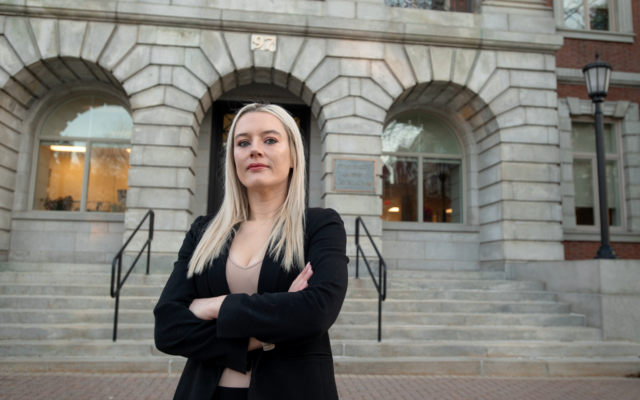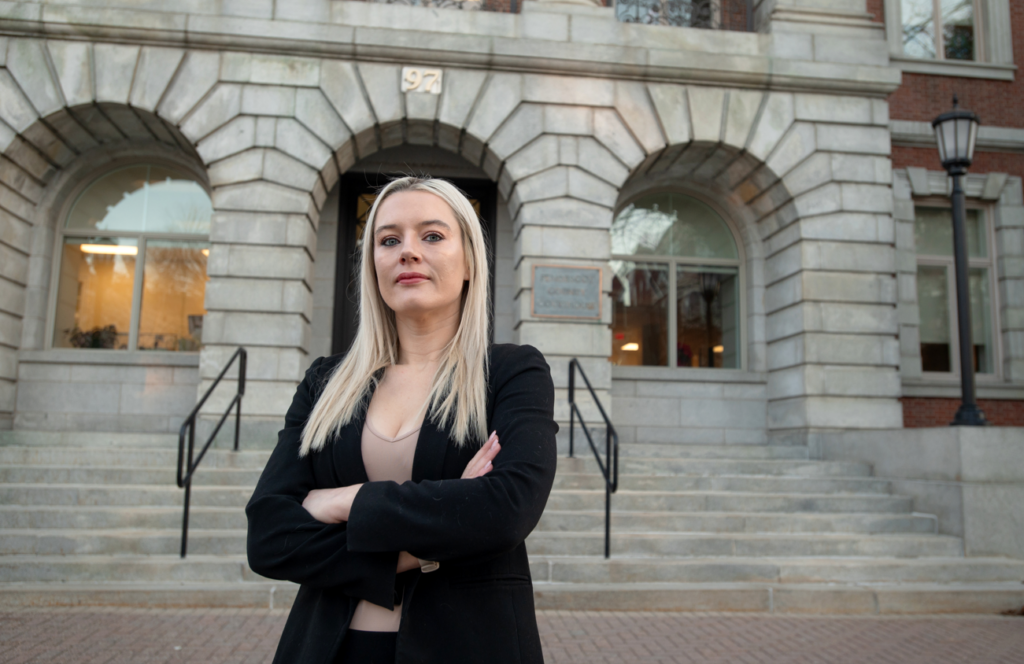
Victim services across Maine brace for 60-percent funding cut
By Erin Rhoda, Bangor Daily News Staff
Maine organizations that serve crime victims are facing a likely loss of $5.9 million in the fall, which represents nearly 60 percent of their main federal funding source, prompting fear that agencies helping thousands of victims of domestic and sexual violence and other crimes will have to lay off staff and reduce programs unless the Maine Legislature fills in the gap.
The organization facing the largest funding loss is the Maine Coalition to End Domestic Violence, which projects it could lose $2.9 million next fiscal year, or about 30 percent of the annual revenue that it mostly passes on to local domestic violence resource centers that work directly with victims. It also funds a shelter for people escaping sex trafficking and a 24-hour helpline for people navigating unsafe relationships.
The shortfall stems from a drastically decreasing amount of money in the federal Crime Victims Fund, which depends on deposits of fines and penalties paid by people convicted in federal cases. The fund was established by the Victims of Crime Act of 1984, or VOCA, to support victim assistance programs nationwide.
The fund has been shrinking because federal prosecutors are increasingly entering into agreements with defendants instead of prosecuting their cases, sending any monetary penalties stemming from the settlement agreements to the U.S. treasury instead of the Crime Victims Fund. The funding decline comes at a time when more victims are reaching out for help.

ASSISTANT DA — Chelsea Lynds, an assistant district attorney for Penobscot and Piscatiquis Counties, stands in front of the old Penobscot County courthouse on Hammond Street in Bangor.
About 16 Maine entities, some of which are umbrella organizations that fund other groups, stand to lose a total of $5.9 million next year. It would represent a 62-percent decline from the average annual amount of VOCA funds given to Maine providers — about $9.5 million — since 2018, according to funding data from the federal government and the Maine Department of Health and Human Services, which administers the grant.
“We’re talking about reducing actual personnel available to provide these services by 50 to 60 people statewide,” said Francine Garland Stark, executive director of the Maine Coalition to End Domestic Violence. “It’s not overspeaking to call that catastrophic. There’s just not enough bodies already.”
In addition to the Maine Coalition to End Domestic Violence, the funding helps support the Maine Coalition Against Sexual Assault’s local resource centers; Pine Tree Legal Assistance’s attorneys representing victims of domestic and sexual violence; victim witness advocates in district attorney’s offices and the attorney general’s office; the judicial branch’s court-appointed special advocates for children; the Immigrant Resource Center of Maine; the Elder Abuse Institute of Maine; and Legal Services for the Elderly.
The Maine Department of Health and Human Services delayed the problem of declining VOCA dollars by saving some occasional higher funding over time to distribute in leaner years. But after five years of flat funding, any extra is gone, said Melissa Martin, public policy and legal director for the Maine Coalition Against Sexual Assault, which estimates it will lose about 17 percent of the funding that it sends to local sexual assault response centers.
Martin is hopeful that a fix is possible — Sen. Anne Carney, D-Cape Elizabeth, has introduced a bill to provide $6 million next year. But, Martin said, “if the VOCA cuts were to not be solved by the state, we’d be talking about really taking us back 10 years or more to when we didn’t have this infrastructure in place. We built this infrastructure for a reason.”
The U.S. Department of Justice is trying to keep the Crime Victims Fund solvent, so reductions are designed “to protect the balance of the fund over the long term so that it can continue to serve victims in the years ahead,” a spokesperson for the department wrote in an email.
Congress passed legislation in 2021 to alleviate some of the low deposits in the Crime Victims Fund, “but it hasn’t caught up yet,” Martin said. “There’s this big deficit to the fund on the federal level. It’s been hitting states, and then it’s really going to hit states hard this year.”
For instance, the safe house for victims of sex trafficking in Androscoggin County is funded entirely with VOCA dollars and costs a minimum of $500,000 per year to run, Stark said. The house has six rooms and served 29 people in the last year. Without funding, Stark said there will be no home as it’s not possible to whittle away parts of the program.
Other services, such as the statewide, 24-hour helpline, would likely be scaled back at a time of decreasing volunteers and increasing calls, Stark said. About 9,700 people — representing 18,790 calls — phoned the domestic abuse helpline last year, up from about 7,000 in 2019.
“I do think that people increasingly are unwilling to accept levels of abuse and violence in their life,” Stark said, “so they’re reaching out and looking for a pathway.”
Advocates across the coalition’s network are also seeing an increase in clients, whether they are victims of abuse or family or community members seeking resources. Of their 15,147 clients last year, 12,706 were victims of abuse or violence, the highest number ever, Stark said. Advocates help victims plan for their safety, run support groups, provide emergency shelters and transitional housing, and help victims navigate legal and social service systems.
“Because we haven’t really gotten increases in resources over the years, we’re still really doing more and more work with fewer people — fewer paid people and fewer volunteer people. I think we have reached the point where there’s just no more capacity to do more with less. We’re going to have to do less with less,” Stark said.
VOCA funding also supports the work of children’s advocacy centers across Maine, where specially trained interviewers talk to children who have disclosed being sexually abused. Police, child welfare workers and prosecutors can watch the interviews from a separate room and use the information for potential criminal or child protective cases.
The goals are to reduce children’s trauma by preventing them from having to be interviewed multiple times and to have a trained interviewer ask questions in a non-leading way to get to the truth.
VOCA dollars are not evenly distributed across organizations in Maine, and children’s advocacy centers in particular rely heavily on the money, Martin said. For instance, the center located in the midcoast is nearly fully funded by VOCA.
The centers are even more important now because, under a new Maine law that took effect in October, the recorded interviews can be admitted to a court, limiting the amount of time children must testify, said Chelsea Lynds, an assistant district attorney for Penobscot and Piscataquis counties.
Lynds was the first prosecutor in Maine to use the new law and submit an interview recorded at a children’s advocacy center to a court. The victim in her sexual abuse case was between 6 and 8 years old when the abuse occurred, and 10 at the time of the trial in November.
Lynds, who specializes in physical and sexual abuse prosecutions, originally thought the child would have no problem testifying because she had given strong, detailed answers during her interview at a children’s advocacy center. But as the trial neared, the child became more and more nervous about having to talk in front of her family in court.
“When I went to prep her for the trial, which was the week of the trial, she just shut down. She really did not want to talk about the abuse at all,” Lynds said. “I didn’t think she was going to be able to talk about the abuse because she just froze up.”
The court accepted the video of the child’s interview and played it in lieu of the victim having to share specifics on the stand. She was still cross-examined by the defense attorney who focused more on the girl’s credibility, not details of the abuse, Lynds said, and the girl was able to answer questions well.
Most of the time there is no physical evidence in child sexual abuse cases, meaning successful prosecutions depend on children’s testimony. If funding cuts eliminate the ability of children’s advocacy centers, or CACs, to get kids in for an interview right away and at all hours, it’s likely police will stop using them, Lynds said.
“A key component of our CAC is their availability. They are always able to work with us to get an interview done even if they are packed full, which they are,” Lynds said. “If the CAC is not able to serve these children at the capacity that they are now, it will affect our ability to prosecute these cases — even more so now with this new law.”
The defendant in her case, Scott Havens, 47, of Bangor, was convicted on all charges: three counts of gross sexual assault and seven counts of unlawful sexual contact. He was sentenced to 25 years in prison with 15 years of supervised release.
Rhoda is editor of Maine Focus. She may be reached at erhoda@bangordailynews.com.